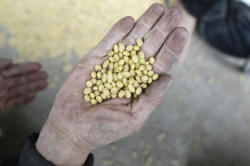|
 U.S.
moves to revoke claim that soy protein protects the
heart U.S.
moves to revoke claim that soy protein protects the
heart
 Send a link to a friend
Send a link to a friend
[October 31, 2017] By
Toni Clarke
(Reuters) - The U.S. Food and Drug
Administration on Monday proposed a rule revoking the right of companies
to say soy protein protects the heart, while potentially allowing a more
circumspect health claim.
|
|
 The agency, which to date has never revoked a health claim, said
studies published since it authorized the soy protein claim in 1999
had shown inconsistent results. The agency, which to date has never revoked a health claim, said
studies published since it authorized the soy protein claim in 1999
had shown inconsistent results.
"Our review of that evidence has led us to conclude that the
relationship between soy protein and heart disease does not meet the
rigorous standard for an FDA-authorized health claim," the agency
said in a statement.
The FDA said that if its proposed rule is finalized, it would
consider allowing the use of a qualified health claim, which
requires a lower scientific standard of evidence than an authorized
claim.

The move comes nearly a decade after the FDA announced its intent to
reevaluate the scientific evidence for certain health claims,
including the one that soy protein may lower the risk of heart
disease.
The American Heart Association has long advocated revoking the soy
health claim. In a 2008 comment on the FDA's intent to reevaluate
the evidence, the association said: "Direct cardiovascular health
benefit of soy protein or isoflavone supplements is minimal at
best."
In the same comment, the association urged the FDA not to allow the
use of a qualified health claim.
[to top of second column] |

"Consumer research conducted by AHA, the FDA and others has
repeatedly shown that despite the presence of qualifying language,
consumers do not understand qualified health claims and do not
understand that they are based on limited and varying degrees of
evidence," the organization said.
American Heart Association officials were not immediately available
to comment on the FDA's most recent announcement.
(Reporting by Toni Clarke in Washington; Editing by Chizu Nomiyama
and Lisa Von Ahn)
[© 2017 Thomson Reuters. All rights
reserved.] Copyright 2017 Reuters. All rights reserved. This material may not be published,
broadcast, rewritten or redistributed.
 |